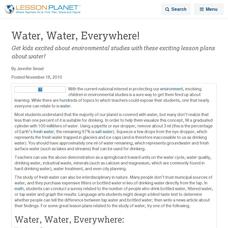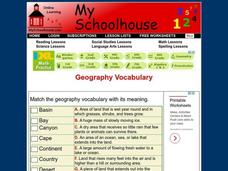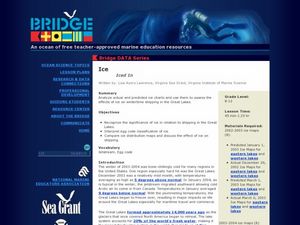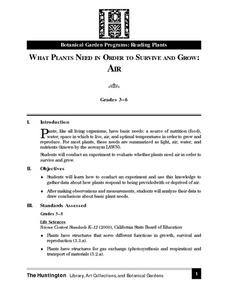Curated OER
The External Anatomy of the Crayfish
Students investigate the external anatomy of a crayfish. In this arthropod lesson plan, students study the structures of the head, the body and the appendages of a crayfish. They locate specific structures present in arthropods and...
Curated OER
The Sun as the Driving Force of the Water Cycle
Students study the water cycle and how the sun is an important factor. In this water cycle lesson students investigate how to desalinate water and explore the different densities of fresh versus saltwater.
Curated OER
Water, Water, Everywhere!
Get kids excited about environmental studies with these exciting lesson plans about water!
Curated OER
What Is A Community?
Young scholars engage in a lesson which introduces the definition of a community and challenges them to explore the characteristics of their own community. This lesson uses the true story of Humphrey the Lost Whale as an illustration of...
Curated OER
Water Pollution Prevention and Conservation
Young scholars examine how to conserve water. They also discover how to prevent water pollution. They examine the Earth's water distribution as well.
Curated OER
Where in the World Is All the Water?
Learners investigate the distribution of the earth's water. They conduct a demonstration of water distribution, and create a pie graph to display the results.
Curated OER
Is the Hudson River Too Salty to Drink?
In this estuary instructional activity, students examine data about the salinity of the Hudson River, create a graph from given data and complete 12 short answer questions about the data and graph.
Curated OER
Designing A Study
In this designing a study worksheet, middle schoolers conduct a study on all types of fish that live in the Hudson River. They complete 8 various types of questions that include mostly short answer in response to their findings. Students...
Curated OER
Basics of Science
In this basics of science worksheet, students review the metric system, the difference between homogenous and heterogenous mixtures, the scientific method, and science lab first aid. This worksheet has 15 short answer, 43 fill in the...
Curated OER
Geography Vocabulary
For this identifying geographic terms and their definitions online interactive worksheet, learners match the vocabulary words with their definitions. Students match 24 answers.
Curated OER
Air and Water in the Environment
Students explore the traits of water condensation and evaporation. In this water cycle lesson, students develop an awareness of the importance of water for sustaining life. Students participate in a hands-on activity in which water is...
Curated OER
Designing a Study
Students explore features to consider when designing a scientific study. In this science research lesson, students examine different methods of data collection and consider which method would be appropriate for determining how many types...
Curated OER
Is the Hudson River Too Salty to Drink?
Students explore reasons for varied salinity in bodies of water. In this geographical inquiry lesson, students use a variety of visual and written information including maps, data tables, and graphs, to form a hypothesis as to why the...
Curated OER
Drinking Water
In this drinking water worksheet, students complete a crossword puzzle given 23 clues about drinking water purification, water content, contaminants, and softeners.
Curated OER
Water Conservation
Students explore types of water reserves. In this water conservation lesson, students brainstorm ways water are used in their homes. Students use a graduated cylinder to simulate the amount of water on Earth and the amount that humans use.
Curated OER
Creating a Pond Habitat
Students create a pond habitat inside and outside their classroom. For this pond lesson plan, students create a habitat with animals, water, and plants in order to create a proper pond habitat.
Curated OER
The Intertidal Zone: Tide and How Creatures Survive
Students explore oceanography by completing science worksheets. In this tide pools lesson, students discuss the forces of the tide pools, the animals that live within them, and the impact they have on the rest of the ocean. Students...
Curated OER
Predicting the Growth of Microorganisms
Students determine where microorganisms might be found around their school. In this scientific investigation lesson, students collect cultures from various locations and place these in petri dishes. They incubate the cultures to see if...
Curated OER
Water, Water Everywhere and Not a Drop to Drink
Young scholars identify the different stages in the water cycle. In this environmental science lesson, students research about different water pollutants in watershed. They describe ways to purify water.
Curated OER
Iced In
Introduce junior oceanographers to ice conditions in The Great Lakes. The ice map links are no longer available, so you will not be able to have your class perform the mentioned data activity. You can, however, access the Canadian Ice...
Curated OER
Oceanography: Density: Designing a Hydrometer Lab
Students explore water density and design a hydrometer to measure density. This activity is part of Ocean World's home site and excellent resources and links are provided.
Curated OER
Pollution Assessment: Is Wood Lake a Good Lake?
Students become aware of pollution in Richfield Minnesota's Wood Lake, identify sources of pollution in Wood Lake, learn to use variables, equations, spreadsheets and modeling software, and generate solutions for the problem.
Curated OER
Dissolved Oxygen in an Aquatic Ecosystem
Students explain why dissolved oxygen is important in aquatic ecosystems. They evaluate the optimal dissolved oxygen levels for living organisms.
Curated OER
What Plants Need in Order to Survive and Grow: Air
Young scholars conduct an experiment to determine whether plants need air in order to survive and grow. They discuss natural resources, analyze slides, and observe and record data from the experiment.
Other popular searches
- Freshwater Fish
- Freshwater Ecosystems
- Fresh Water Pollution
- Freshwater Organisms
- Fresh Water Salt Water
- Freshwater and Saltwater
- Fresh Water Sources
- Fresh Water Ecosystems
- Freshwater Wetlands
- Fresh Water Biomes
- Boiling Point Fresh Water
- Freshwater Habitats

























